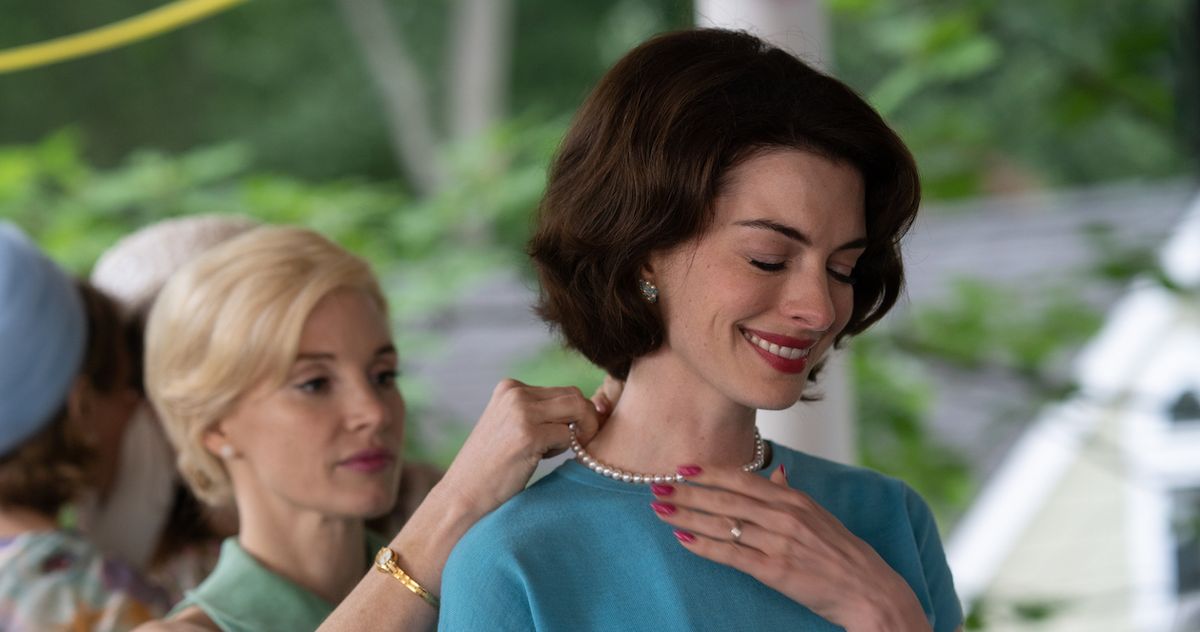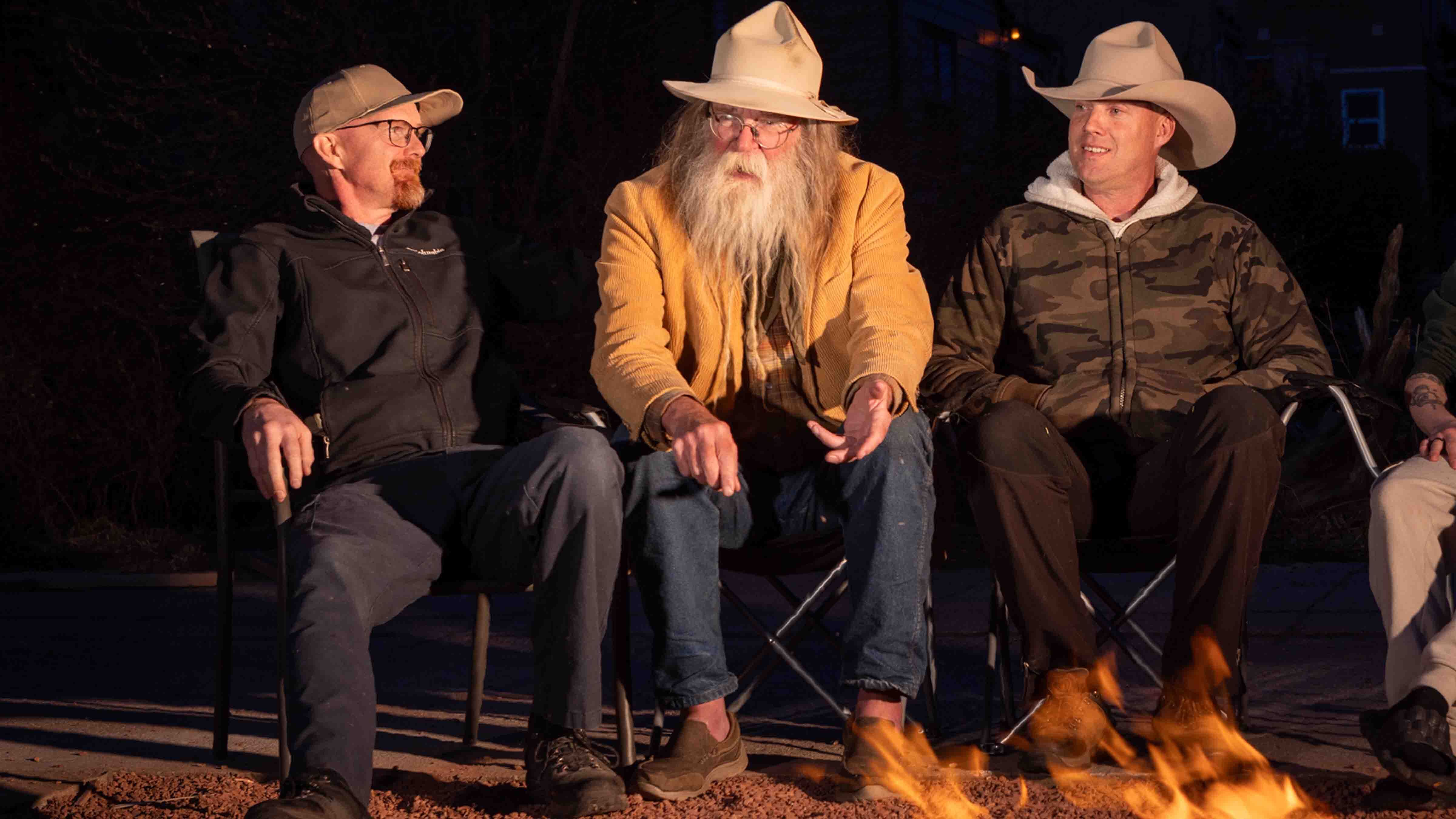Movie Reviews
‘History of Evil’ review: Powerful horror movie is an enjoyable and uncomfortable watch

History of Evil is a haunted house story with an added layer of hate. In 2045 America has become a theocratic police state. A main figure of The Resistance named Alegre Dyer (Jackie Cruz, Orange is the New Black) has broken out of political prison and reunited with her husband Ron (Paul Wesley, Star Trek: Strange New Worlds) and daughter Daria (Murphee Bloom). The rundown house they have hidden away harbors a dark past that begins to eat away at Ron.
The initial moments paint a dystopian picture that is eerily close to coming into focus in the real worl. Terms like âun-Americanâ are casually thrown around, radio broadcasts attack anyone who thinks differently, and though it is never explicitly stated, the state police seemed to be called the J6, a possible reference to a very real travesty. This immediately gives History of Evil an oppressive atmosphere that never goes away. The now North American Federation is a hostile society run by a misguided sense of nationalism and religion.
Writer-director Bo Mirhosseni was inspired by his parentâs who were activists during the Iranian Revolution and human rights is a major part of his film. In an interesting twist, the bleak setting serves as a backdrop to what is can be described as a straightforward horror movie. Which is not to say that History of Evil downplays its deeper message. Instead, it is a story of all kinds of terror â real and supernatural.
The tension Mirohesseni creates in the early moments due to political turmoil morphs over the course of the plot. The group are on the run and are always in danger from their pursuers, but their internal struggles ensure the audience never has a chance to breathe easy. The past is as much of an enemy as the J6. Mixed in with some excellent jump scares and tried and trued horror tropes, and History of Evil is a enjoyably difficult watch.
History of Evil comes to Shudder February 23
Join the AIPT Patreon
Want to take our relationship to the next level? Become a patron today to gain access to exclusive perks, such as:
- â Remove all ads on the website
- ð¬ Join our Discord community, where we chat about the latest news and releases from everything we cover on AIPT
- ð Access to our monthly book club
- ð¦ Get a physical trade paperback shipped to you every month
- ð¥ And more!

Movie Reviews
'Deadpool & Wolverine' movie review: Fox's last dance, Deadpool & Wolverine bromance

Superhero fatigue is real. With no good movies recently, Marvel has lost its course. But brace yourselves — straight from 20th Century Fox, sorry, Disney — a hero makes his grand MCU entrance. He’s the messiah, the merc with a mouth; he is… The Marvel Jesus. Buckle up, peanut, because this isn’t your average cape-and-tights movie — or is it?
Directed by Shawn Levy (‘Free Guy’), this third instalment is a hot mess —kind of like Wade Wilson himself on a bad hair day. Just as the world’s falling apart (again), the Time Variance Authority’s Paradox (Matthew Macfyden) recruits him to put his timeline out of its misery. Deadpool refuses and drags the worst variant of the Wolverine (Hugh Jackman) out of retirement to help stop this crazy scheme. They are sent to the ‘Void’ — yes, the same one from ‘Loki’ season one, episode five, now ruled by Cassandra Nova (Emma Corrin), Professor Charles Xavier’s evil twin.
The film takes you on a wild ride with surprise appearances from the Fox Universe. The plot is a bit shaky with jokes that sometimes fall flat, but it’s saved by some really cool action sequences, with slow-motion effects set to popular ’90s tunes. It’s a fun, if messy, farewell to the Fox universe, offering a peek at what mutant battles might look like in the MCU — and it doesn’t look too bad. Ryan Reynolds keeps it lively with his snappy humour, and Hugh Jackman proves yet again why he’s the ultimate Wolverine, leaving us with a touching montage of his ‘X-Men’ moments during the end credits.
So, does this Marvel messiah live up to the hype? Well, yes and no. Deadpool doesn’t exactly ace it. He’s the irritating but quirky hero we didn’t even know we needed, flipping the MCU on its head and turning multiversal crises into comedy gold. Marvel dug deep into the Fox universe, like scraping the last bits of chicken from a biryani pot.
The movie might do well at the box office, but they really need to sort out their timelines (pun intended) before they kick off the Mutant Saga.
Published 26 July 2024, 20:20 IST
Movie Reviews
What If Jessica Chastain and Anne Hathaway Had a Mother-Off, and We All Lost?

The strange case of Mothers’ Instinct.
Photo: Neon
There’s a new movie starring Jessica Chastain and Anne Hathaway out this week, which is normally the sort of thing you’d expect to have heard about. But, after its release in the U.K. months ago, Mothers’ Instinct is slipping into U.S. theaters with as little splash as an Olympic diver nailing a triple somersault tuck. The film, a thriller directed by Benoît Delhomme, is getting the treatment typically reserved for a disaster, which is a shame, because I’ve been dying to discuss it with someone, and that’s hard when no one has any idea what you’re on about. Mothers’ Instinct is, indeed, pretty terrible, and not in the so-bad-it’s-good sense, and yet there’s something strangely moving about it. It’s a poignant example of how what looks like rich material to actors can turn out to be lousy material for audiences. Mothers’ Instinct is a remake of a 2018 Belgian film adapted from a novel by Barbara Abel, and watching it, you can appreciate exactly why these two major actors signed on to star in it. Funnily enough, those same qualities go a long way toward explaining why the movie doesn’t work.
Mothers’ Instinct isn’t camp, but it’s close enough that if you squint, you can almost see a version of the film that tips into something broader. Of course, if you squint, you wouldn’t be able to appreciate how immaculately Chastain and Hathaway are costumed. They look incredible — not like two 1960s housewives, which is what they’re playing, so much as two people who keep switching outfits because they can’t decide what to wear to the high-end Mad Men–themed party they’re headed to later. As Alice, Chastain is styled like a Hitchcock blonde in pin-curled ash updos and cardigan sets, while as Alice’s neighbor and friend Céline, Hathaway is given a Jackie O. look that involves a shoulder-length bouffant, pillbox hats, and gloves. They’re cosplayers in a gorgeous, airless setting, adjoining houses on a street that might as well be floating in space, the husbands (played by Anders Danielsen Lie and Josh Charles) vanishing to work for long stretches. The artificiality of this intensely manicured re-creation isn’t to any particular end, which gives the whole movie the air of a Don’t Worry Darling situation in which no one ever wakes up to the twist, instead sleepwalking through a stylized dream of Americana.
In fact, while Alice is restless over having given up her job as a journalist to take care of her son Theo (Eamon O’Connell), and Céline gets ostracized by the community after the death of her son, Max (Baylen D. Bielitz), Mothers’ Instinct isn’t actually all that interested in the pressures of living under a repressive 1960s patriarchy. Instead, it’s about another time-tested theme, one that’s best summed up as: Bitches be crazy. The perfect sheen of its surfaces — Delhomme, who’s making his directorial debut, is a cinematographer who started his career with The Scent of Green Papaya and has since worked with everyone from Tsai Ming-liang to Anton Corbijn — is paired with a score that shrieks unease from the opening scene, in which Céline is thrown a surprise birthday party. The source of this suspense isn’t revealed until later, after Max takes an unintended swan dive off the porch and the women’s friendship is threatened by grief, guilt, and suspicion. Is Céline in mourning, or does she actually irrationally blame Alice for what happened while developing an alarming fixation on Theo? Is Alice right to be suspicious of her bestie, who’s unable to have another baby, or is she being paranoid because the mental illness that previously resulted in her hospitalization has returned? Is it odd that two feminist actors jumped to participate in a film that traffics so freely in unexamined stereotypes about women and hysteria?
Not, it seems, when the opportunities to stare coldly into space or look on in glassy betrayal are this good. I’m not trying to sound snide here — the characters in Mothers’ Instinct have no convincing inner lives at all, but the exterior work of the actors playing them is choice stuff. When Alice and Céline are getting along, Chastain and Hathaway nuzzle together supportively like long-necked swans. When things start to go south, Chastain opts for an aloof distance with stricken eyes, while Hathaway prefers a labored smile that drops as soon as she’s alone. Theirs is a brittle-off no one can win, but both try their hardest anyway. The effort reaches its crescendo at Max’s funeral, where Hathaway’s enormous eyes glimmer through the barrier of a black lace veil and Chastain tilts her face up so that the elegant tracks of past tears can gleam in the light. The scene ends with Céline collapsing in anguish while Alice rushes her tantrumming child out of the church, an explosion of drama that would be so much more effective if the movie had left any room for modulation instead of starting at 10 and staying there. Mothers’ Instinct gets much sillier before it ends, but given how little it establishes as its baseline tone, it doesn’t feel fair to say it goes off the rails. Rather, as Hathaway stares brokenly into the dark and Chastain tears apart her nightstand drawer in panic, what comes to mind is how great a set of GIFs this movie will make someday. That’s not much, but I guess it’s something?
See All
Movie Reviews
Movie Review: Twisters – Kenbridge Victoria Dispatch

Movie Review: Twisters
Published 11:15 am Friday, July 26, 2024
1 of 3
Let me immediately cut to the chase (pun intended) and answer the question you’re all wondering. TWISTERS is a fun and entertaining summer blockbuster, but it in no way holds a candle to its predecessor TWISTER (1996). Still, the CGI is intense, the sound design is loud and immersive, and the lead performances — especially from Glen Powell — are sure to wow.
Following a horrible tragedy, meteorologist Kate Carter (Daisy Edgar-Jones) has spent years out of the storm chasing business. She now lives in the largely tornado-less New York City, using her innate understanding of storm systems to direct weather alerts. But when her old friend Javi (Anthony Ramos) begs her to join his privately-funded start-up, which is designed to use military-grade radars to learn more about tornadoes and save communities in Oklahoma, she agrees to give him a week of her time. It’s not too long before “tornado wrangler” influencer Tyler Owens (Glen Powell) enters the scene with his ragtag group of weather enthusiasts, creating a competition between scientific research and entertainment. Each group races to be the first on the scene, with Kate and Javi seeking to model the tornado and Tyler trying to get the most likes on social media. But can the two groups find a way to work together or will the competition be more vicious than the tornadoes?
I am admittedly judging myself for caring too much about a summer blockbuster’s plot, because that’s not really what any of us sign up for with these films. But the various encounters with tornadoes begins to feel slightly repetitive and creates pacing issues, making a two-hour film feel like its runtime. And for some reason, it seems like there is something missing when it comes to portraying the sheer terror of experiencing F5 tornadoes, unlike the original film; the main set pieces were not as memorable.
The film does little to make you care about whether the characters live or die, relying on Glen Powell and Daisy Edgar-Jones’s chemistry and natural charisma to do the heavy lifting. The second Powell steps out of his gigantic truck, with his cowboy hat and belt buckle sparkling in the sun… sorry, I just lost my train of thought… and that’s what TWISTERS is hoping. Powell’s magnetism is sure to knock you off your feet and distract you from the film’s middling plot. And while Edgar-Jones’s performance is more muted, due to her character’s battle with PTSD, she brings an important level of humanity to the film and a character to both see yourself in and root for. More than that, her chemistry with Powell is off the charts and will certainly leave you wanting their relationship explored more in a sequel. The supporting characters are not given much to work with and as such, don’t really engender much concern when they are in deadly situations.
One element of TWISTERS I liked more than TWISTER is it showed the emotional and financial toll tornadoes ravage on communities. Of course, that is an element of the first film, but TWISTERS does a great job showcasing the speed in which tornadoes can overtake and devastate a community, both in loss of life and loss of property. This, juxtaposed with the “fun” in chasing storms brings a real human element to the film. I also want to give a shoutout to the movie not having any sad animal scenes (apart from a possible run-in with a chicken). So for all of you sickos excited to see another flying cow, this isn’t for you.
TWISTERS is the exact kind of movie you need to see in a theater so you can get the full experience. Where else can you admire the cinematography, get immersed in the sound design, and lose yourself in Glen Powell’s cowboy hat and million dollar smile? I saw it in a Dolby theater and was blown away.
There is no end credit scene.
My Review: B
-

 World1 week ago
World1 week agoOne dead after car crashes into restaurant in Paris
-

 Midwest1 week ago
Midwest1 week agoMichigan rep posts video response to Stephen Colbert's joke about his RNC speech: 'Touché'
-

 News1 week ago
News1 week agoVideo: Young Republicans on Why Their Party Isn’t Reaching Gen Z (And What They Can Do About It)
-

 Movie Reviews1 week ago
Movie Reviews1 week agoMovie Review: A new generation drives into the storm in rousing ‘Twisters’
-

 News1 week ago
News1 week agoIn Milwaukee, Black Voters Struggle to Find a Home With Either Party
-

 Politics1 week ago
Politics1 week agoFox News Politics: The Call is Coming from Inside the House
-

 News1 week ago
News1 week agoVideo: J.D. Vance Accepts Vice-Presidential Nomination
-

 World1 week ago
World1 week agoTrump to take RNC stage for first speech since assassination attempt

















